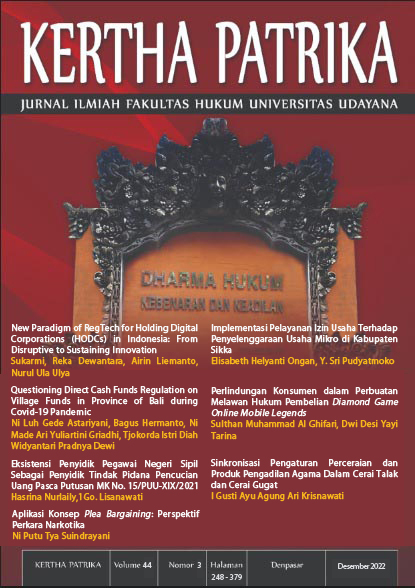New Paradigm of RegTech for Holding Digital Corporations (HODCs) in Indonesia: From Disruptive to Sustaining Innovation
Abstract
The digital era demands transformation of all sectors, including the sector of economic law. The concept of economic law that is demanded to transform and transplant itself is the legal concept in the digital founding of companies. Companies no longer possess conventional schemes; they have transformed in terms of management patterns, market reach, and even organizational structure toward digital concepts, and therefore the law must be adaptive with these developments. The research for this article has the objective of forming new legal paradigms in the founding of companies. It takes the form of a normative legal research with usage of the philosophical and statute approaches. The results of the research showed that the adoption of concepts from the New Paradigm Theory of Kuhn requires a new legal paradigm with a new legal regime, because the old legal regime is not adaptive to the new form of companies with the conception of an enterprise form utilizing a technological approach through the aid of Regtech.
Downloads
References
Antariksa, Y. (2020). Kenapa Valuasi Gojek 12x lebih Tinggi dibanding dengan Garuda Indonesia? Available from https://strategimanajemen.net/2018/12/31/kenapa-valuasi-gojek-12x-lebih-tinggi-dibanding-garuda-indonesia/ (Accessed on September 14, 2020).
Antonio, R. (2020). Fenomena Bakar Uang Ala Start-up dan Gelembung Ekonomi. Available from https://www.kompasiana.com/basingbe/5defa080097f36616a7a4d92/fenomena-bakar-uang-ala-startup-dan-gelembung-ekonomi?page=1 (Accessed on January 20, 2020).
Baldwin, T. (Ed.). (2020). The Cambridge History of Philosophy 1870-1945. Cambridge: Cambridge University Press. 2008, p. 411, in Martunus, R. W. Struktur Revolusi Sains Thomas Kuhn. Available from https://falsafahkita.wordpress.com/struktur-revolusi-sains-thomas-kuhn/ (Accessed on June 8, 2020).
Budiansyah, A. (2019) Bukalapak Hingga Dana, Ini Start-Up yang Masih Bakar Uang. Available from https://www.cnbcindonesia.com/tech/20191210151827-37-121924/bukalapak-hingga-dana-ini-Start-Up-yang-masih-bakar-uang (Accessed on December 13, 2019).
Danrivanto. (2014). Teori Hukum Konvergensi. Bandung: PT Refika Aditama.
Drajat, A., & Kartika, D. (2017). Start-Up Guidebook, Panduan Memulai Start-Up Bisnis Yang Harus Kamu Tahu. Bantul: Penerbit Quadrant.
Halim HS, & Nurbani, E. S. (2013). Penerapan Teori Hukum Pada Penelitian Tesis dan Disertasi. Jakarta: Raja Grafindo Husada.
Lubis, M. S. W. (2018) OJK Terbitkan Aturan Fintech, Ini Poin-Poinnya. Available from https://finansial.bisnis.com/read/20180902/89/834081/ojk-terbitkan-aturan-fintech-ini-poin-poinnya (Accessed on August 6, 2019).
Marzuki, P. M. (2007). Penelitian Hukum. Jakarta: Penerbit Kencana.
Mertokusumo, S. (2012). Teori Hukum, Revised Edition. Yogyakarta: Penerbit Cahaya Atma Pustaka.
Narari, Y. N. (2018). Homo Deus, Masa Depan Umat Manusia. Jakarta: Alvabed.
Notification G.S.R. 501 (E) New Delhi, May 23, 2017
Okhasa, S. (2002). Philosophy of Science: A Very Short Introduction. Oxford: Oxford University Pres, p. 82.
Passagi, J. H., & Amalia, R. (2019). Mengenal Financial Technology di Indonesia. CTRL+ Bulletin, Article 1, Yogyakarta: Center for Law, Technology, RegTech and LegalTech Studies.
Pertiwi, P. (2020). RegTech : Cara Teknologi Membantu Bank Penuhi Kepatuhan di Era Digital. Available from https://www.integrity-indonesia.com/id/blog/2018/02/07/regtech-cara-teknologi-membantu-bank-penuhi-kepatuhan-di-era-digital/ sourcing Deloitte, RegTech Solutions Will Help Firms to Automate Compliance Tasks and Reduce Operational Risks (Accessed May 30, 2020).
Putra, N. N. (2017), Fintech Rawan Dipakai untuk Pencucian Uang dan Pendanaan Terorisme. Available from http://www.hukumonline.com/berita/baca/lt5946e0e4c4d4c/fintech-rawan-dipakai-untuk-pencucian-uang-dan-pendanaan-terorisme (Accessed on August 8, 2019).
Saputra, A. (2020). Susu Formula dan Teori Chaos dalam Hukum. Available from https://news.detik.com/kolom/d-1562318/susu-formula-dan-teori-chaos-dalam-hukum (Accessed on June 8, 2020).
Schizas, E., McKain, G., Zhang, B.Z., Garvey, K., Ganbold, A., Hussain, H., Kumar, P., Huang, E., Wang, S., & Yerolemou, N. (2019). The Global RegTech Industry Benchmark Report. University of Cambridge, Judge Business School.
Schwab, K. (2015, December 12). “The Fourth Industrial Revolution.” Available from https://www.foreignaffairs.com/articles/2015-12-12/fourth-industrial-revolution
Soemitro, R. H. (1988). Metodologi Penelitian Hukum dan Jurimetri. Jakarta: Penerbit Ghalia.
Sukismo B. (2008). Karakter Penelitian Hukum Normatif dan Sosiologis. Yogyakarta: Puskumbangsi Leppa UGM.
Venalia R., & Januarita, R. (2019¸ February). Pengawasan Otoritas Jasa Keuangan terhadap Layanan Pinjam Meminjam Berbasis Teknologi Informasi Dihubungkan dengan Prinsip Transparansi dalam Mekanisme Financial Technology di Indonesia. Prosiding Ilmu Hukum, Vol.5, No. 1.
Wijayanto, D. (2018). Legal Start-Up Business. Solo: Metagraf.











